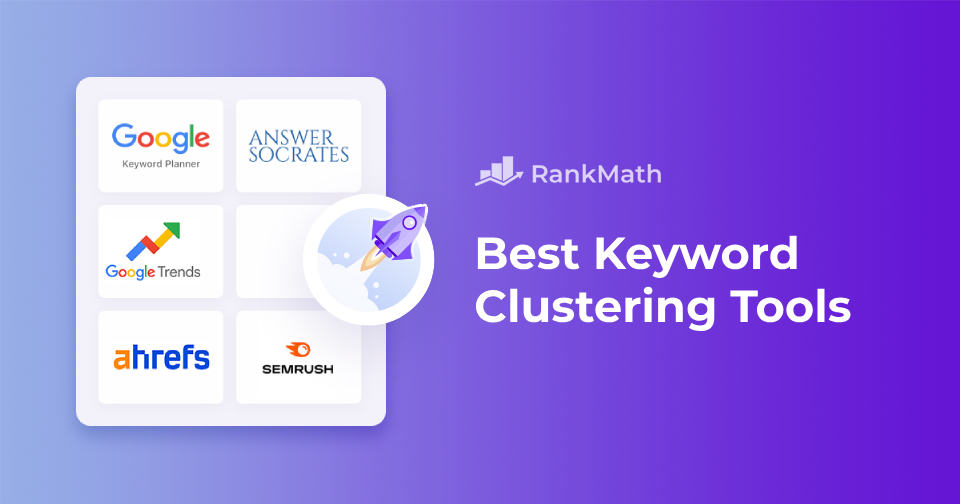As you explore your SEO efforts further, managing all the keywords you want to rank for can become increasingly challenging.
Fortunately, you don’t have to handle everything manually. Keyword clustering tools can do the heavy lifting for you.
Keyword clustering is a strategy for enhancing online visibility and content relevance. It involves grouping related keywords into clusters based on their similarities and search intent.
This technique not only streamlines keyword research but also significantly improves content organization and targeting.
In this post, we’ll discuss the best keyword clustering tools to improve your search engine rankings.
So, without any further ado, let’s get started.
Table Of Contents
1 What is Keyword Clustering?
Keyword clustering is the process of organizing a large set of keywords into groups or clusters based on their semantic similarities and shared search intent.
This method helps in creating more targeted and relevant content, improving SEO performance by ensuring that each piece of content addresses a specific topic comprehensively.
By identifying and grouping closely related keywords, you can create more focused and relevant content, improving your chances of ranking higher in search engine results.
Advantages of Using Keyword Clustering Tools
Keyword clustering offers several advantages that significantly enhance the effectiveness of SEO strategies and content marketing efforts.
One primary benefit is improved content relevance and targeting.
You can create highly focused and relevant content by organizing keywords into clusters based on their similarities and search intent. For instance, a fitness blog that clusters keywords such as cardio exercises, strength training tips, and bodyweight exercises can create targeted articles for each cluster, ensuring that each piece of content thoroughly addresses specific audience queries.
Another advantage of keyword clustering is better content organization and website structure. Clustering keywords allows you to plan your content more strategically, ensuring that each topic is covered comprehensively without overlap. This structured approach prevents keyword cannibalization, where multiple pages compete for the same keywords, diluting their SEO effectiveness.
Additionally, keyword clustering tools streamline the keyword research process by automating the grouping of related keywords, saving you time and effort.
Keyword clustering improves SEO performance by enabling more effective internal linking strategies. By linking related content within clusters, you can enhance the site’s navigation and distribute link equity more efficiently.
2 Best Keyword Clustering Tools
Now that you know keyword clustering, let’s discuss the keyword clustering tools.
2.1 Google Keyword Planner
Using Google Keyword Planner as a keyword clustering tool involves using its powerful keyword research capabilities to identify and organize related keywords into meaningful clusters.
To start, access Google Keyword Planner through your Google Ads account.
Once logged in, navigate to the Keyword Planner, as shown below.
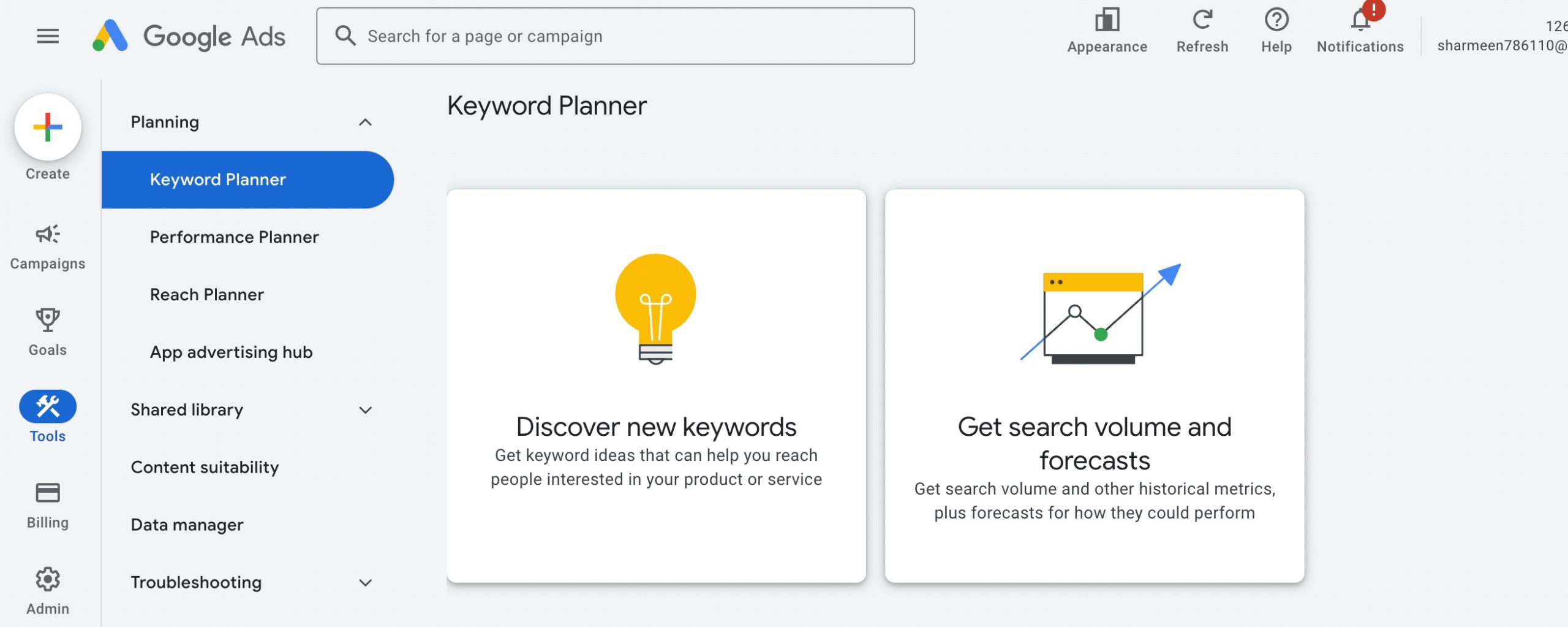
Start by selecting the Discover new keywords option.
Next, navigate to the Start with keywords tab. Enter a broad keyword or phrase related to your niche or business. For example, if you run a fitness blog, you might enter workout or fitness.
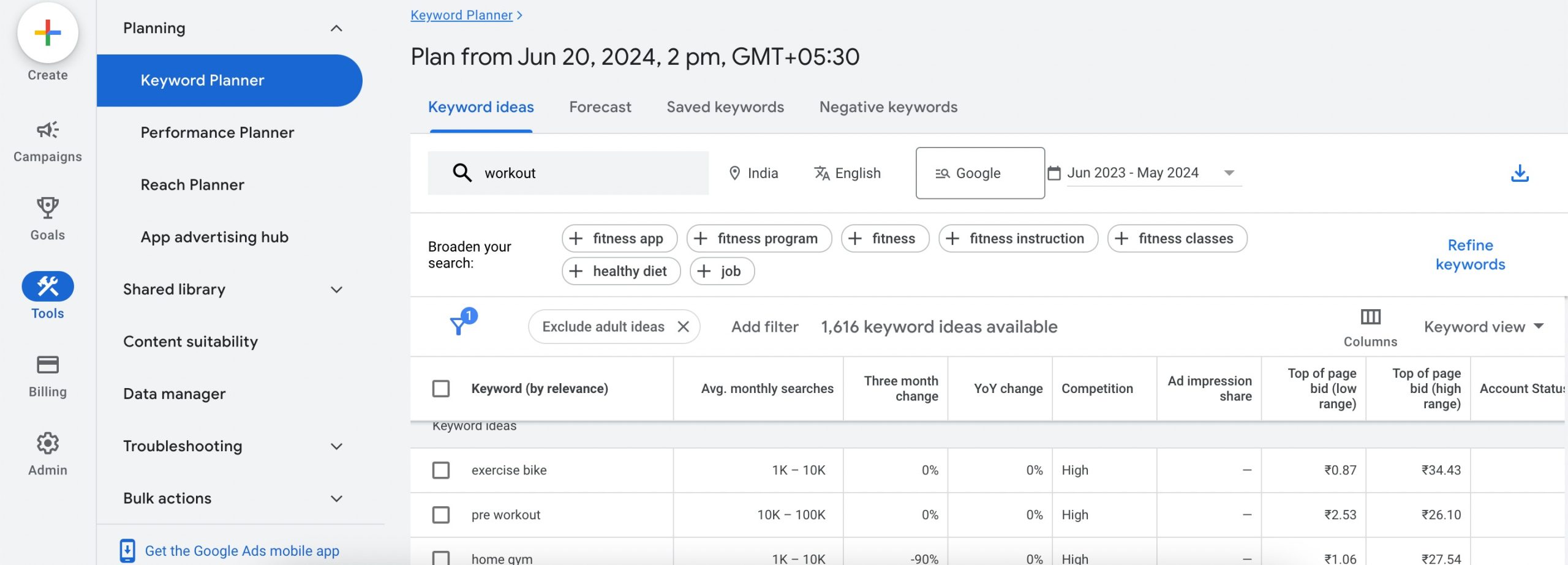
Once you input your initial keyword, Google Keyword Planner will generate a list of related keywords along with their search volume, competition level, and other relevant metrics.
Next, create keyword clusters by grouping related keywords. Instead of using the Keyword view, switch to the Grouped view, as shown below.
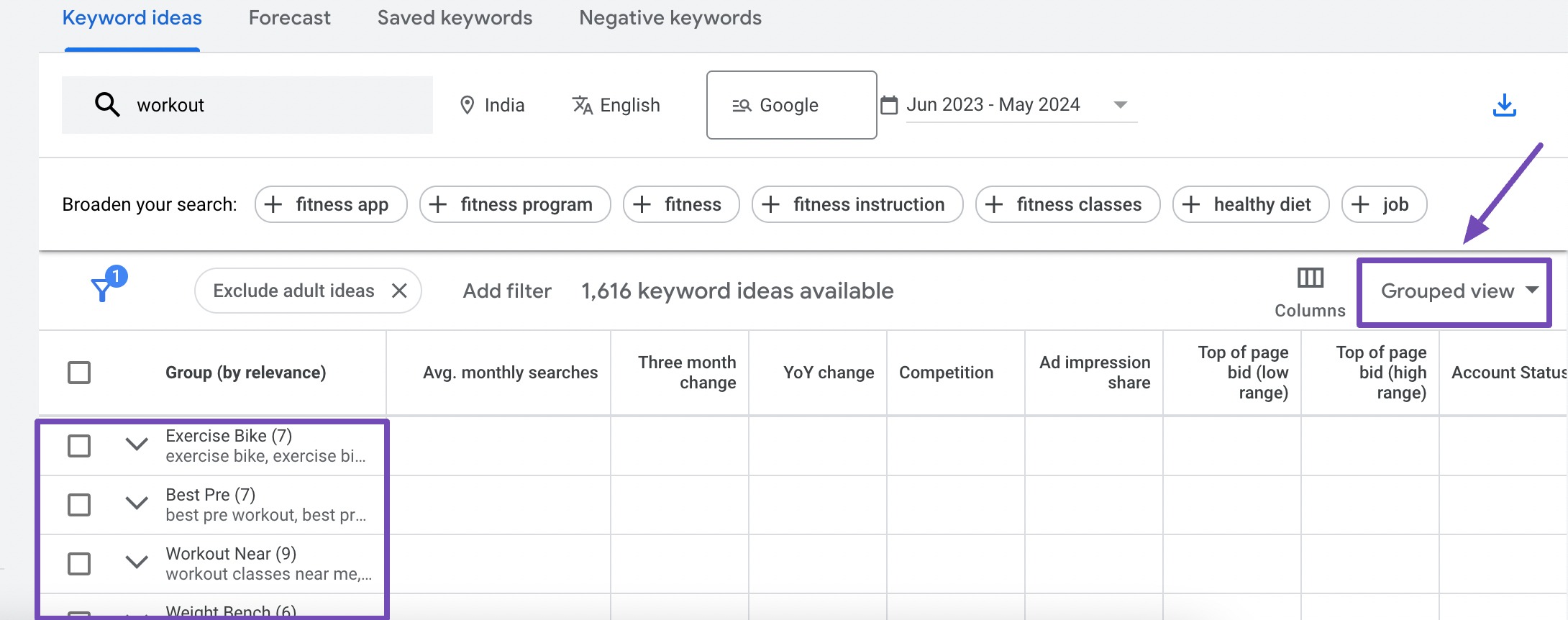
In this view, you’ll see a list of keywords organized by relevance. This feature is incredibly useful because it shows all the keywords you can target in a single article, giving you a clear picture of potential ranking opportunities.
To further refine your clusters, use the filtering and sorting options in Google Keyword Planner. For instance, the Best Pre group includes all the keywords related to pre-workout. You can then sort keywords by search volume or competition to prioritize the most valuable keywords within each cluster.
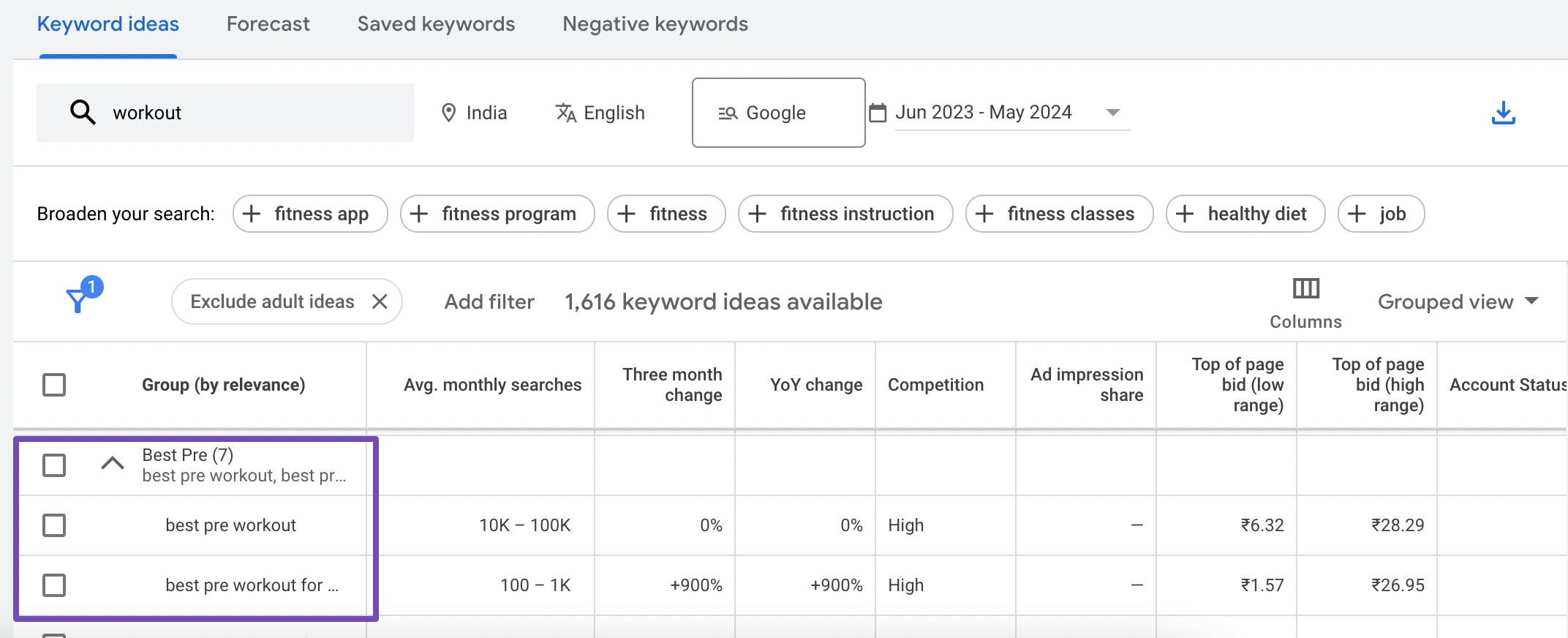
This helps ensure that your content targets high-traffic and less competitive keywords, maximizing its potential impact.
2.2 Ahrefs Keyword Explorer
Using Ahrefs Keyword Explorer to find and cluster keywords is a straightforward process that can significantly enhance your SEO strategy.
First, log in to your Ahrefs account and navigate to the Keyword Explorer tool. Enter a keyword or phrase relevant to your niche. For instance, if you run a fitness blog, you might start with fitness as a keyword.
Once you enter your keyword, the Overview report in Ahrefs will generate a comprehensive report listing related keywords, search volumes, keyword difficulty scores, and other valuable metrics.
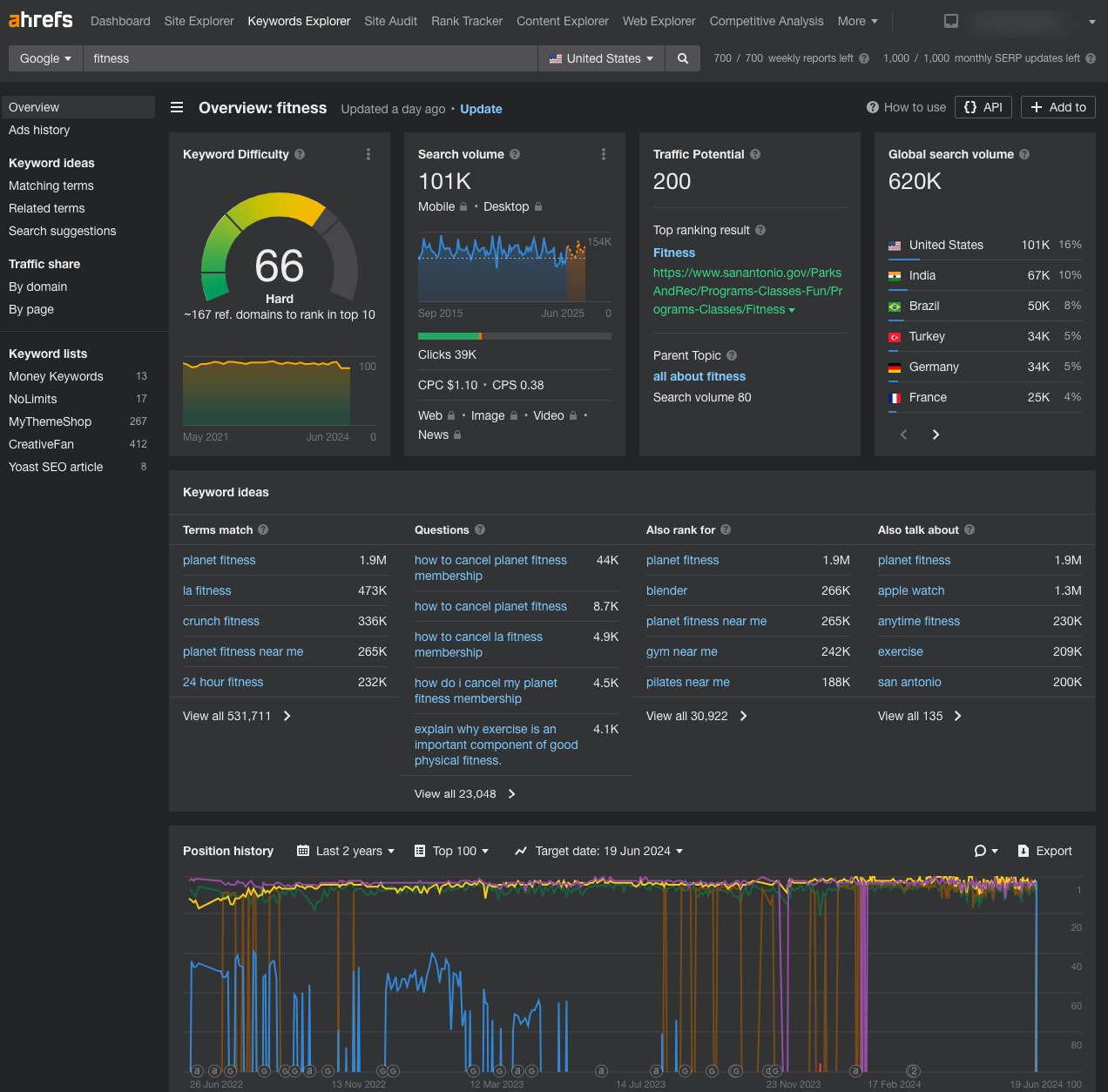
After generating the keyword report, navigate to the Terms match section. This will filter the keywords to show only those that include your seed term. You’ll see keywords that contain your seed term along with relevant metrics.
Identify keywords with the same user intent and group them into clusters. For instance, you can create clusters such as lifetime fitness, crunch fitness, etc.
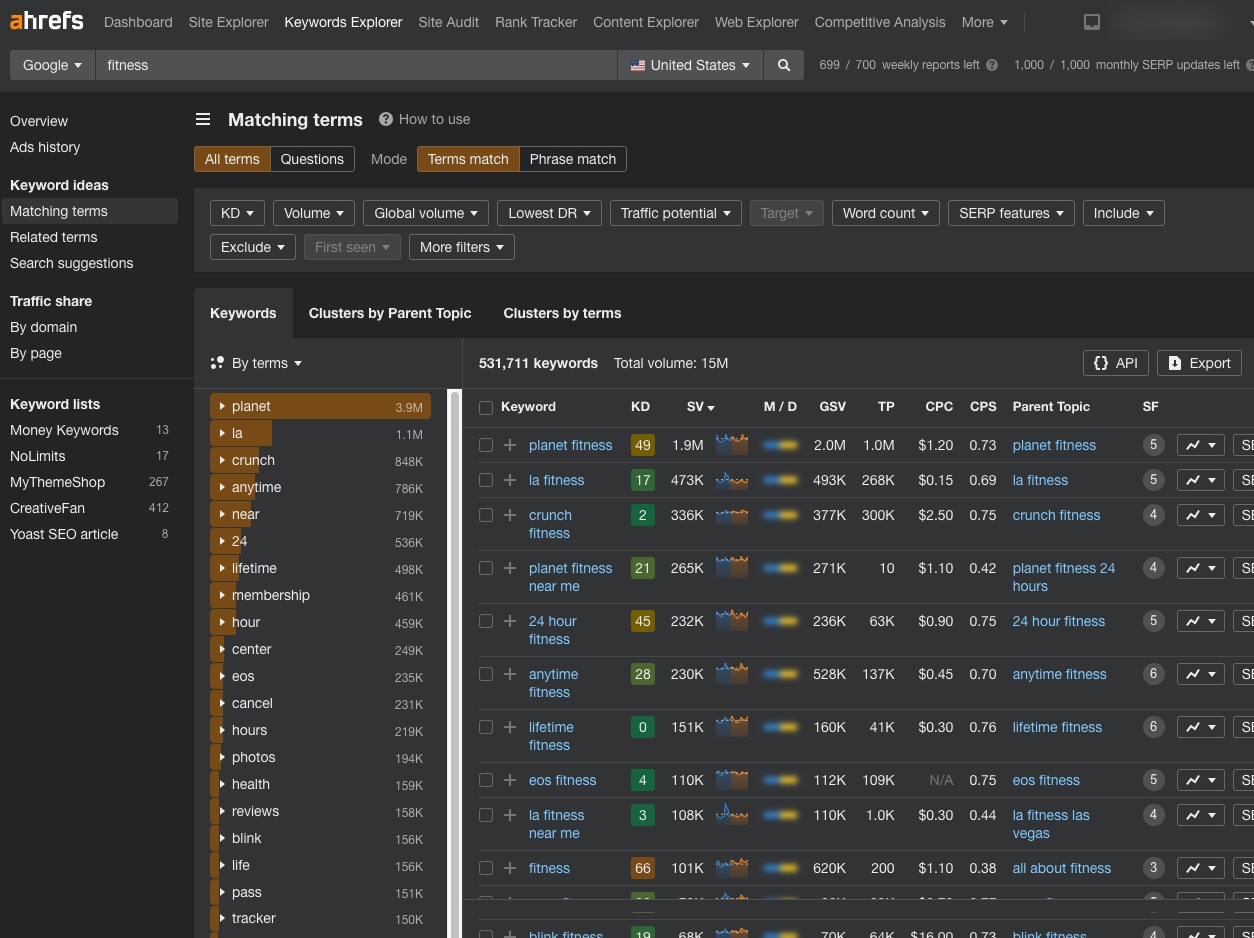
To refine your clusters, use the filtering and sorting options in Ahrefs Keyword Explorer. You can sort keywords by search volume or keyword difficulty to prioritize the most valuable keywords within each cluster.
3 Frequently Asked Questions
How do keyword clustering tools work?
Keyword clustering tools use advanced algorithms to analyze keywords based on similarities and search intent. They automatically group related keywords into clusters, simplifying keyword organization.
Can keyword clustering tools integrate with other SEO tools?
Yes, many keyword clustering tools integrate with popular SEO tools like Google Keyword Planner and Ahrefs, allowing for the import and export of keyword data.
How often should I update my keyword clusters?
It’s recommended to update your keyword clusters regularly, at least quarterly, to keep up with changing search trends and ensure your content remains relevant and competitive.
How can keyword clustering improve my content strategy?
By identifying and organizing related keywords, keyword clustering helps you create more focused and comprehensive content. It ensures that your content addresses various related queries and improves overall SEO performance.
Can keyword clustering tools help with local SEO?
Yes, keyword clustering tools can help identify and group local keywords, enabling you to create content that targets specific geographic areas and improves local search rankings.
4 Conclusion
Keyword clustering tools have become essential components of SEO strategies.
By automating the complex task of organizing keywords into meaningful groups, these tools help you to develop more targeted, relevant, and comprehensive content strategies.
Utilizing keyword clustering tools is essential for staying competitive, meeting audience needs, and achieving higher search engine rankings.
Adopting these tools can transform your keyword research process, providing a strategic advantage in creating content that matches your audience’s intent and drives sustained engagement and traffic.
If you like this post, let us know by Tweeting @rankmathseo.
